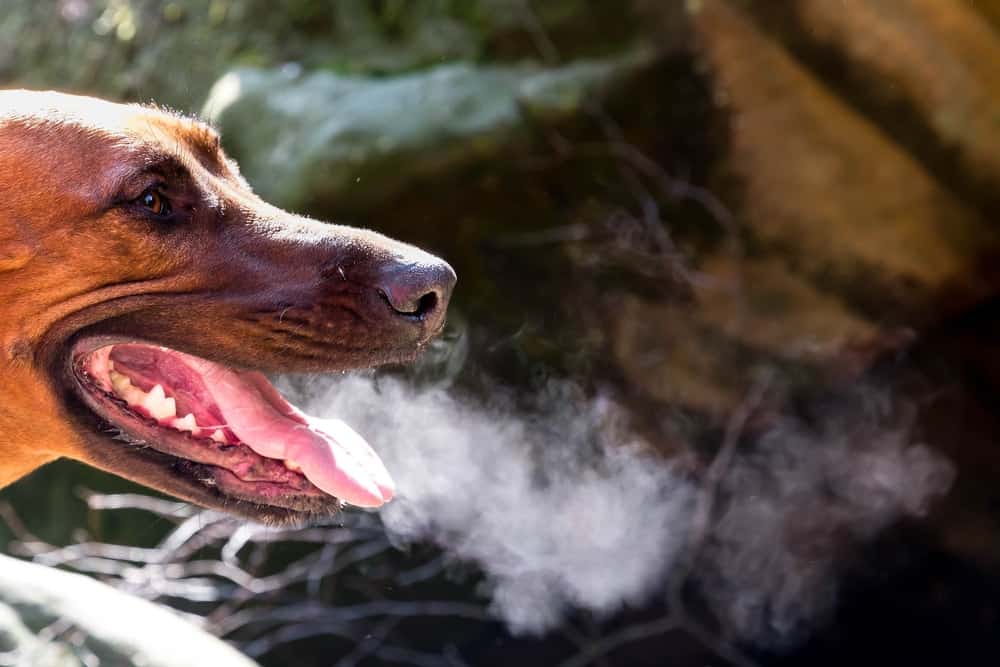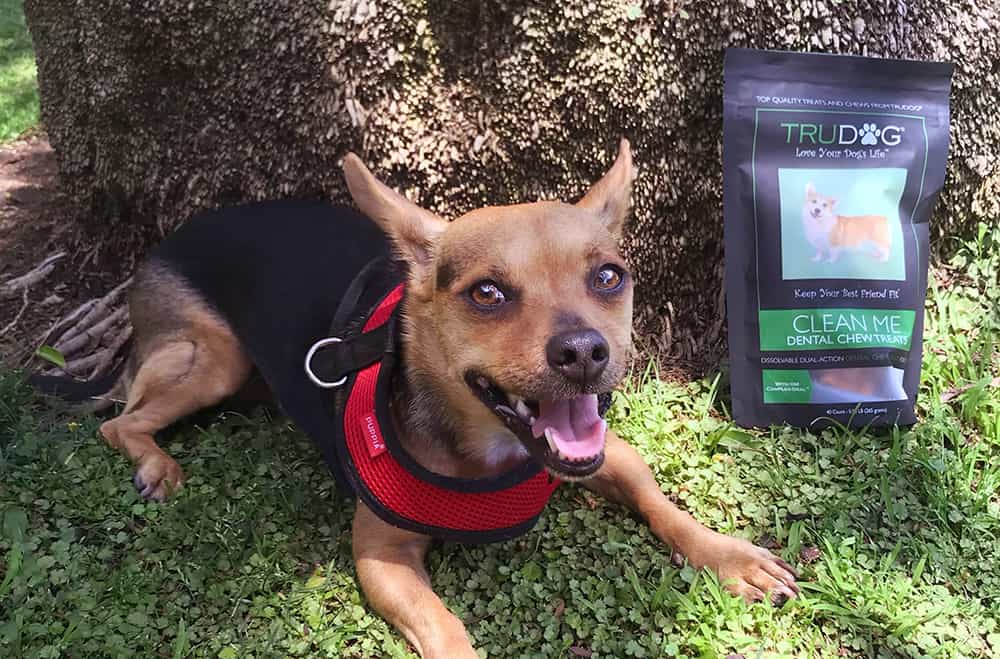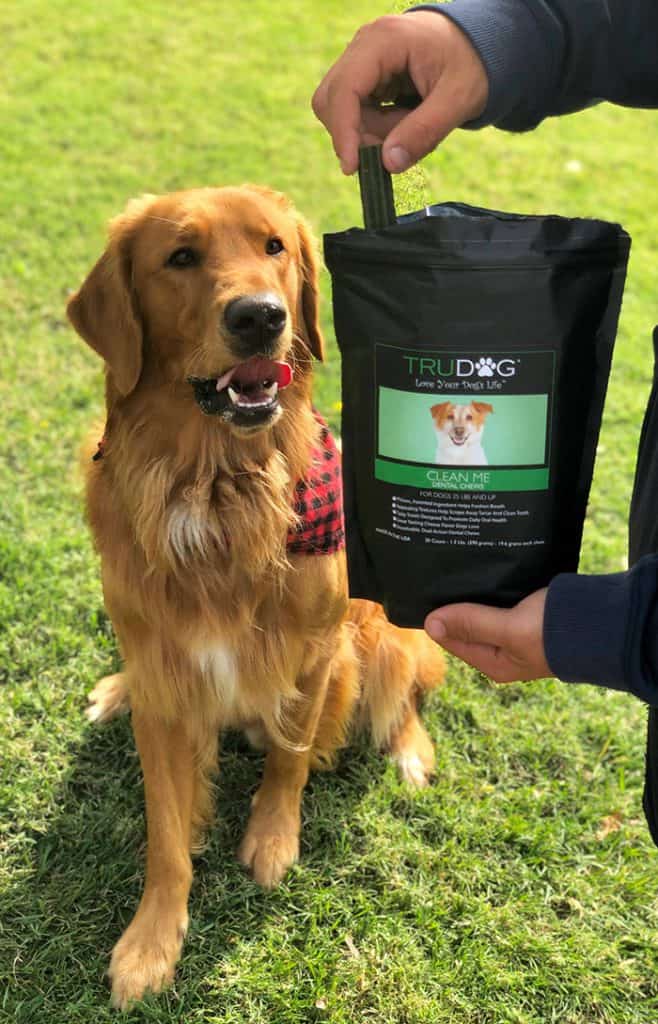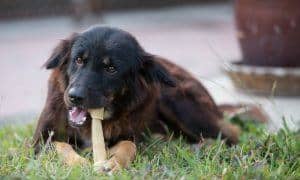“This post contains affiliate links, and I will be compensated if you make a purchase after clicking on my links.”
Contrary to what you might believe, not all dogs have bad breath. Quite the opposite, In fact!
Healthy dogs, with a good daily dental routine and no underlying health concerns, should NOT have chronically gag-worthy breath. If your dog’s got bad breath, it’s more than just a stinky problem – it could be an indicator of something more serious.

Remember, the occasional whiff of stinky dog breath is rarely something to worry about and is usually the result of something your dog’s recently eaten. But, bad breath that is persistent should not be ignored.
Why does my dog have bad breath?
There are a wide variety of reasons that dogs develop halitosis, or chronic bad breath. Some of these causes are relatively minor and easy to fix while others are quite serious and will require veterinary treatment.
1. Teething: Bad breath in young puppies is very often a result of teething, and should only last for a few months. The stinky smell is the result of bacteria that builds up at the puppy’s gumline as baby teeth are pushed out by emerging adult teeth.
2. Periodontal Disease: By and large, periodontal disease is the most common culprit behind your best friend’s bad breath. A vast majority of dogs over the age of 3 will show signs of this condition, which can become quite painful if it is allowed to progress.
3. Oral Disease: In addition to periodontal disease, other diseases of the mouth – including gum disease, both malignant and benign oral masses or tumors, or physical growths and malformations of tissues within the mouth that become breeding grounds for bacteria – can result in a smelly kiss.
4. Gastrointestinal Disease: If the teeth, gums, and oral health have all been ruled out as causes of halitosis, the next possible source is the esophagus, stomach, intestines, or other parts of the gastrointestinal system.
5. Other Potential Causes: Several other, less common, sources of smelly dog breath can involve metabolic diseases – kidney disease is known to produce a uniquely sour breath, while diabetes produces a sweet or fruity breath, respiratory issues, cancers, or liver disease.
What can I do at home?

1. Provide regular veterinary care. At every visit, your vet should examine your dog’s teeth and gums for any apparent visible causes for his less-than-pleasant breath. In all cases, catching and treating any developing issues early offers the very best results.
2. Feed your dog a high-quality, appropriate diet for optimum overall health. Proper nutrition is the foundation of your dog’s overall health and vitality. Not all commercial dog foods are created equal and what’s appropriate for one dog may not be right for another. Find a dog food that is easy for your dog to digest, doesn’t cause upset stomach or excess gas.
3. Feed your dog from the right type of bowl. Yes, it seems silly, but the bowl or dish from which you feed your dog can make a difference in his digestive health. If your dog tends to eat too quickly, try a slow-feed bowl.
4. Brush your dog’s teeth! Brushing your dog’s teeth regularly – most veterinarians recommend doing it daily – is one of the most important preventative health measures you can take at home. And yet, it’s something that very few dog owners take seriously. Frequent, regular brushing is the best way to prevent periodontal disease, gum disease, and the growth of bad-breath causing bacteria. (Note: Make sure you’re brushing with a veterinary, pet-approved toothpaste as human toothpaste can be toxic to dogs)
5. Provide safe chew toys. As another layer of breath-busting protection, provide your dog with toys designed especially to promote healthy teeth and gums. If you have a puppy with bad breath as a result of teething, provide him with teething toys that will not only soothe painful gums, but will help to wash away stench-producing bacteria through the act of healthy chewing.
6. Use breath-busting, teeth-cleaning treats. There are a variety of products made especially to combat canine halitosis, including plaque-fighting treats like TruDog’s CLEAN ME Dental Chews. With patented ingredients like O.M. Complex-Oral™, plus gut-healthy anise seed and parsley to combat your dog’s stinky breath right at the source.
But don’t take our word for it. See what these dog parents had to say after feeding Clean Me treats to their beloved dogs:

“All four of my dogs love the chews and look forward to them before bed every night. I started using them because I could not reach the back teeth in my toy poodles and they were beginning to be covered with tartar. But the chews have done the job and not only are their teeth sparking clean now but their breath is really fresh as well! I am thrilled.” -Carlyn C.
“This are by far my Great Danes’ favorite treat and they make their breath so much better which is really important for those giant size kisses!” -Denise Y.
Remember, because they can’t tell us when they aren’t feeling well, it’s our responsibility to watch for any signs or symptoms of changes in our dog’s health. A super stinky kiss is one of those signs and should always be taken seriously.
Click here to purchase or learn more about TruDog’s CLEAN ME Dental Chews.





















